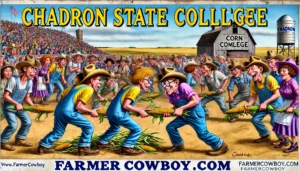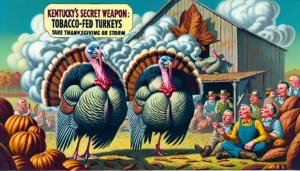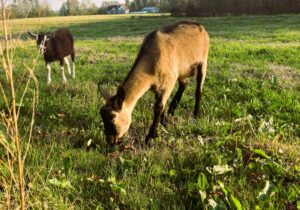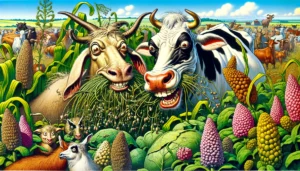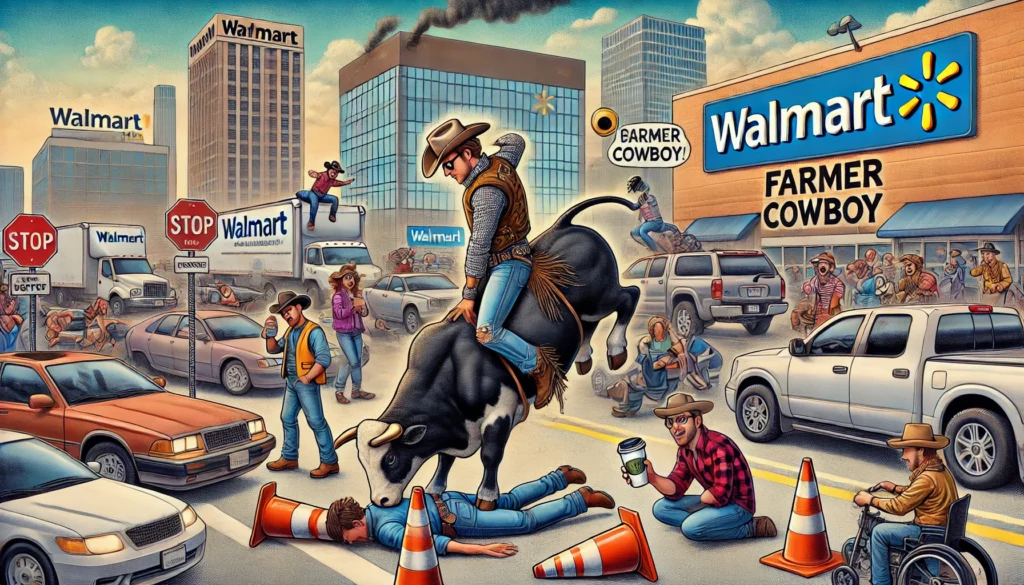
Urban Rodeo A humorous and detailed cartoon style image showing a rodeo event in an urban setting specifically a Walmart parking lot. In the foreground a rodeo 5.webp.webp
Concrete Cowboys: Saddle Up for Rodeo in the Urban Jungle
How City Slickers Are Wrangling Bulls, Busting Broncs, and Bringing the Wild West to a Parking Lot Near You
Los Angeles, CA — In a world where the wild west collides with urban sprawl, the latest craze sweeping the nation isn’t a new fusion food or tech startup—it’s the rise of Concrete Cowboys, where rodeo meets city living. Forget the open plains and dusty trails; today’s cowboys are dodging traffic and weaving between skyscrapers, all while trying to keep their hats on.
Starbucks and Saddle Sores
The day begins, naturally, at the local Starbucks, where riders order their “Yeehaw Latte”—extra strong, because when you’re about to wrangle bulls in a parking lot, you need the kind of energy that only overpriced coffee can provide. According to barista turned bull rider, Tanner “No Spurs” Thompson, “It’s tough, but someone’s got to keep the spirit of the west alive, even if it means dodging potholes and pedestrians.”
The rodeo itself is hosted in the only available space: the Walmart parking lot. With traffic cones taking the place of barrels and shopping carts serving as makeshift fences, it’s a miracle that no one has mistaken the bulls for aggressive shoppers during Black Friday.

Bulls on Concrete: What Could Go Wrong?
Spectators were in for a treat—or a trip to the emergency room—when they witnessed the most dangerous sport in history: bull riding on concrete. “I’ve never seen a bull slip and slide like that,” commented local EMT, Sam “Patch ‘Em Up” Garcia. “It’s almost more dangerous than the real thing. Almost.”
Bronco busters in this urban jungle have to be more agile than ever before, as they navigate not only the thrashing beast beneath them but also the unforgiving surface beneath their boots. Expert opinion from the American Association of Orthopedic Surgeons suggests that if you’re going to break bones, why not make it memorable with a concrete skid mark?

Skinny Jeans and Rodeo Queens
Fashion is always at the forefront, even for rodeo clowns, who have traded in their classic baggy pants for a more city-appropriate look: skinny jeans. “I never thought I’d see the day when I had to worry about my clown pants being too tight,” remarked Jeb “Squeaky” Wilson, a veteran rodeo clown. “But in the city, image is everything.”
And speaking of image, rodeo queens are now required to swap out their traditional outfits for something that screams “urban chic.” Think rhinestone-studded jackets paired with designer boots that are more suited for walking runways than riding horses.
Lassoing More Than Just Livestock
Urban cowboys face unique challenges, like accidentally lassoing the occasional Uber driver instead of a stray calf. It turns out that in the concrete jungle, you’re more likely to rope a Toyota Prius than a wild steer. “I thought it was just a really fast cow,” confessed Hank “Two Thumbs” Johnson, now the proud owner of a 4.98-star Uber rating.
But this is the new rodeo—one where adaptability is key, and where the phrase “rodeo drive” has a whole new meaning.
The Crowd Goes Wild… When the Car Alarm Goes Off
Spectators bring their own flair to the event. Instead of the usual cowbells, they prefer to set off their car alarms in support of the riders. It’s loud, it’s obnoxious, and according to self-proclaimed rodeo expert, Chad “Big Noise” Morgan, “It really adds to the atmosphere—just like the sound of stampeding cattle, but in a city sort of way.”

Testimony from the Urban Tumbleweed
As for the tumbleweeds, they’ve been replaced by their urban counterpart: plastic bags. “I swear, those things are more dangerous than any bull,” claimed one spectator who narrowly avoided being taken out by a particularly aggressive grocery bag.
The real challenge, however, lies in the traffic lights that have become the unofficial countdown clocks for events. “You go on green, but if the bull decides to run on red, well, you better be ready,” laughed Colt “Fast Hands” McAllister, a seasoned rodeo hand who has spent more time dodging cars than calves.
Swapping Horses for Scooters
In this new era of urban rodeos, horses are becoming obsolete. Why bother with a four-legged friend when you can rent an electric scooter for half the price? “It’s all about speed and agility,” explained cowboy-turned-scooter-enthusiast Jimmy “Zippy” Rodriguez. “Just don’t try to lasso anything while you’re riding—it’s a real balance game.”
But scooters aren’t the only thing riders have to worry about. The after-party at the nearest dive bar offers its own set of challenges, including overpriced cocktails and arguments over who rode the bull best. “I’d rather face a bull than another $15 martini,” one cowboy muttered under his breath.

FAQs: Frequently Asked Questions from Concrete Cowboys
- What should I wear to an urban rodeo?
Steel-toed cowboy boots are recommended, not for protection from the livestock, but from the potholes that plague the city streets. As for your hat, make sure it’s windproof—those skyscrapers create some serious drafts. - How do I prepare for the urban rodeo experience?
First, practice barrel racing around traffic cones. If you can navigate through a city traffic jam, you’re ready for anything. - Is there an age limit for urban rodeos?
No, but if you’re over 30, make sure your health insurance is up to date. Concrete and age don’t mix well.
Insider Tips for Surviving the Urban Rodeo:
- Never underestimate the power of a pothole. They’re just as treacherous as any bucking bronco.
- Car alarms are the new cowbells. Embrace the noise—it’s part of the charm.
- Watch out for bike lanes. Remember, in the city, everyone shares the road—even the livestock.
Disclaimer:
This article is a work of satire. No bulls, Ubers, or coffee lovers were harmed in the making of this rodeo. Any resemblance to actual events, living or dead, is purely coincidental—or just a really good guess.
15 Geo-Political Observations:
- Rodeo clowns swapping their baggy pants for skinny jeans—because in the city, even cowboys need to be fashion-forward.
- Barrel racing around traffic cones in a Walmart parking lot: where precision meets a lack of parking spots.
- Bull riding on concrete: finally, a reason to justify the emergency room’s existence on every corner.
- The local Starbucks offering a “Yeehaw Latte” for urban cowboys who need a caffeine boost before the big event.
- Lassoing an Uber driver by mistake: “I thought that was a rogue calf!”
- Finding more hay bales in a craft store than in the rodeo arena.
- When rodeo announcers swap “Y’all” for “Yo!”—a linguistic lassoing if ever there was one.
- Cowboy boots with steel-toed protection because potholes in the city are more dangerous than any bucking bronco.
- Swapping horses for scooters: no saddle required, but good luck staying on at 20 mph.
- Rodeo after-party at the nearest dive bar—where instead of riding mechanical bulls, patrons settle for arguing over overpriced cocktails.
- Urban tumbleweeds: empty plastic bags blowing through the arena, causing more chaos than the livestock.
- “You call that a rope?”—The cowboy’s lament upon discovering it’s just a jump rope borrowed from a CrossFit gym.
- Traffic lights taking the place of the rodeo countdown clock: go on green, and hope the bull sees red.
- Cowbells replaced by car alarms and the occasional “Honk if you love cowboys” bumper sticker.
- Watching out for bike lanes while chasing calves, because in the city, everyone shares the road—even the livestock.
Originally posted 2009-08-22 06:23:27.
Originally Published at FarmerCowboy.com
2024-08-24 20:13:42
Karl Hoffman is a distinguished agriculturalist with over four decades of experience in sustainable farming practices. He holds a Ph.D. in Agronomy from Cornell University and has made significant contributions as a professor at Iowa State University. Hoffman’s groundbreaking research on integrated pest management and soil health has revolutionized modern agriculture. As a respected farm journalist, his column “Field Notes with Karl Hoffman” and his blog “The Modern Farmer” provide insightful, practical advice to a global audience. Hoffman’s work with the USDA and the United Nations FAO has enhanced food security worldwide. His awards include the USDA’s Distinguished Service Award and the World Food Prize, reflecting his profound impact on agriculture and sustainability.
